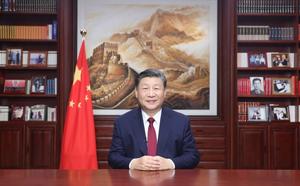Experts laud Chinese leader’s focus on people’s well-being, policy priorities as he ushered in 2024
 Chinese President Xi Jinping delivers his New Year address on Dec 31, 2023 in Beijing, China. (PHOTO / XINHUA)
Chinese President Xi Jinping delivers his New Year address on Dec 31, 2023 in Beijing, China. (PHOTO / XINHUA)
Chinese President Xi Jinping’s New Year speech had a strong focus on the well-being of the people and promoting prosperity, giving hopes of a better life and creating a win-win situation for a world of peaceful coexistence, global experts said.
Xi delivered his New Year message on Dec 31 to ring in 2024, hailing the achievements China has made in various sectors in 2023 and vowing to comprehensively deepen reform and opening-up, enhance economic vitality and steadfastly advance Chinese modernization.
Keith Bennett, co-editor of the Friends of Socialist China online platform, said the New Year address presents a profound, comprehensive and touching panorama and survey of China’s present situation, achievements and perspectives.
What is particularly impressive is the way it relates a grand vision to the issues that most touch on people’s daily lives, from the encouragement of grassroots sports and community activities, such as the “village super league” soccer games, to the embrace by more people of low-carbon lifestyles, he said.
“Making the issues that matter to every family the top priority for government, that is serving the people, is the essence of socialist governance,” he said.
Brian Renwick, a London-based adviser to organizations with a focus on China, said the speech was “positive and energetic”.
To Renwick, what is significant is that Xi mentioned that China’s ultimate goal is about delivering a better life for the people, and that Beijing will work closely with the international community for the common good of humanity.
“Few other leaders pay attention to these philosophies,” Renwick noted.
Chin Yew Sin, a Malaysian political analyst and businessman of Chinese descent, hailed Xi’s New Year speech as “the most holistic and inspiring New Year Message I have ever seen from a world leader”.
He noted that Xi has outlined the current and future economic development models of China, which will be based on, among other things, smart technologies and green innovation.
David Chong, founder and president of the US-China Youth and Student Exchange Association, said the speech had two particularly moving passages for him.
The first emphasized the grand yet simple goal: to improve the lives of ordinary people. The second passage addressed the current conflicts in some parts of the world.
“Upon reflection, it’s clear that the majority of people worldwide share simple aspirations: a secure and comfortable living, peaceful development and the opportunity to thrive in a fair global order, contributing to the well-being of humanity,” Chong said.
The world, particularly the Global South, expects China to maintain a leadership role in 2024 and beyond, said Adhere Cavince, a scholar of international relations with a focus on China-Africa development cooperation.
“President Xi’s assertion that China would carry forward the banner of shared prosperity for humanity as well as play as stabilizer role in the backdrop of intense global geopolitics is not only refreshing, it rekindles hope for a better tomorrow for the world,” said the expert based in Nairobi, Kenya.
Shakeel Ahmad Ramay, chief executive of the Asian Institute of Eco-civilization Research and Development, a think tank based in Islamabad, Pakistan, said Beijing’s commitment to the Chinese style of modernization is getting stronger.
“Modernization driven by innovation is turning China into a new hub of innovation and technology,” he said.
Mehmood Ul Hassan Khan, executive director of the Center for South and International Studies in Islamabad, said Xi’s speech sent a message of advancing Chinese modernization through implementation of a new development philosophy on all fronts, and speeding up building of the new development paradigm, to promote high-quality development and safeguard security.
Noting that Xi mentioned the problems faced by businesses, and issues such as employment and livelihoods, Henry Chan, visiting senior research fellow at the Cambodian Institute for Cooperation and Peace, said this bodes well for solving economic and social problems in 2024.
Dicky Budiman, a public health researcher at Griffith University in Queensland, Australia, noted that Xi mentioned in his speech the issue of medical services and elderly care.
An aging society means new challenges in relation to healthcare and social security, he said, adding that increased focus on the elderly is crucial not only for China but also for many other nations around the world.
Sourabh Gupta, a senior fellow at the Washington-based Institute for China-America Studies, said the people’s development and the right to a better standard of living and a happier future have been at the heart of Xi’s leadership over the past decade, and this people-centric vision will continue to drive his policies.
Chen Yingqun in Beijing, Yifan Xu in Washington, Rena Li in Los Angeles, Wang Xiaodong in Nairobi, Kenya and Yang Han in Hong Kong contributed to this story.
Contact the writers at xingyi@chinadaily.com.cn


